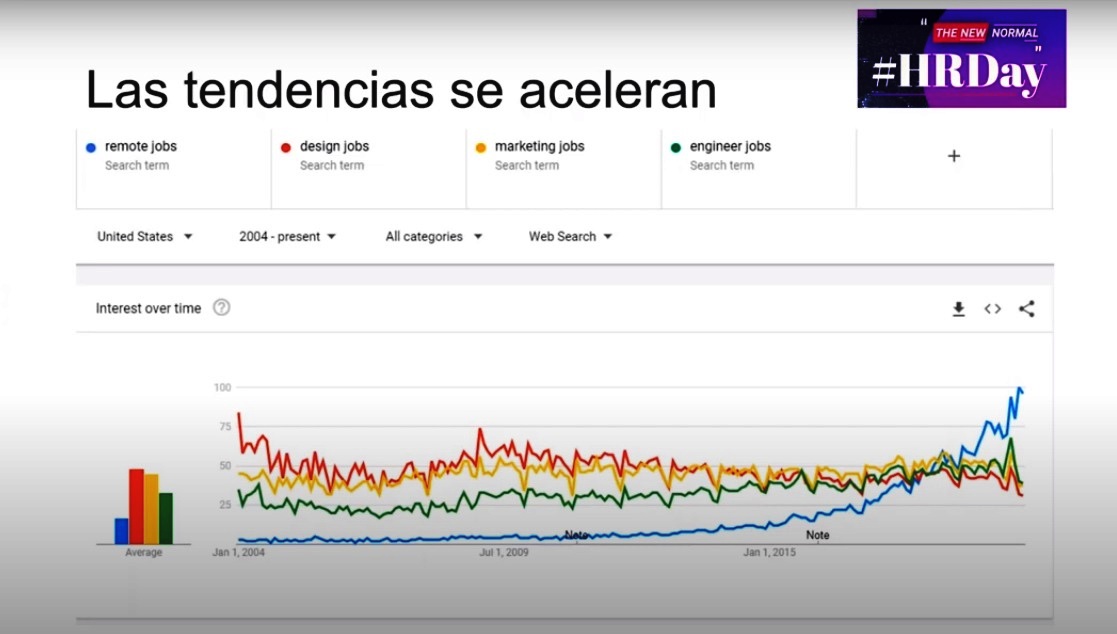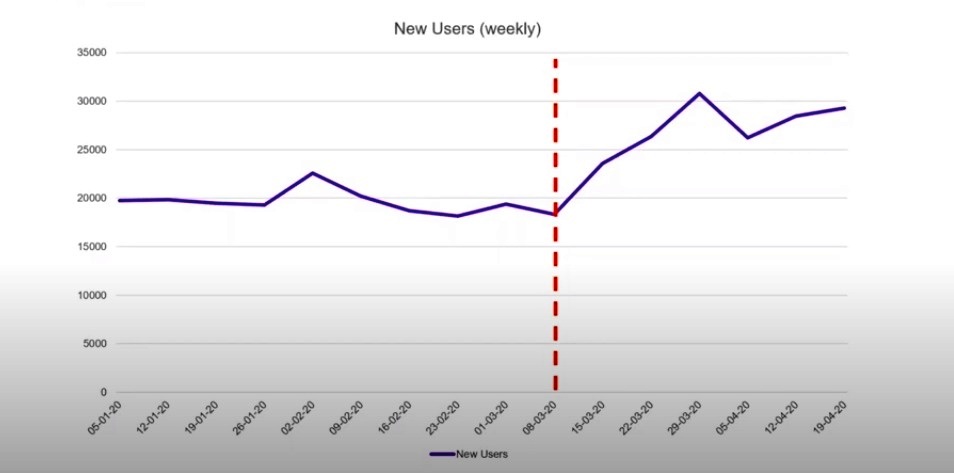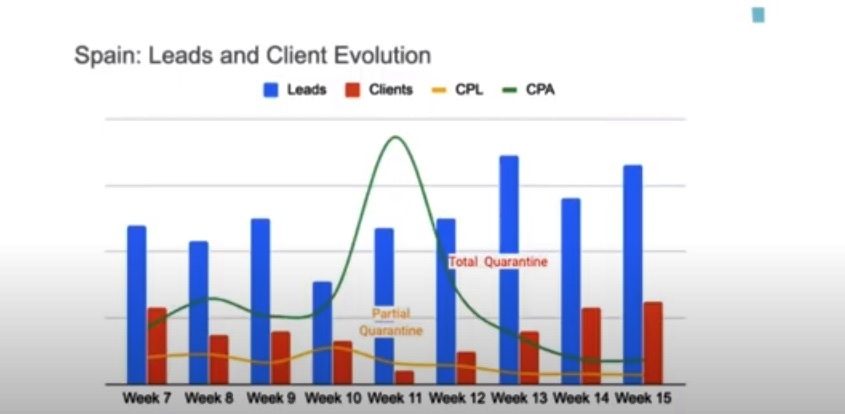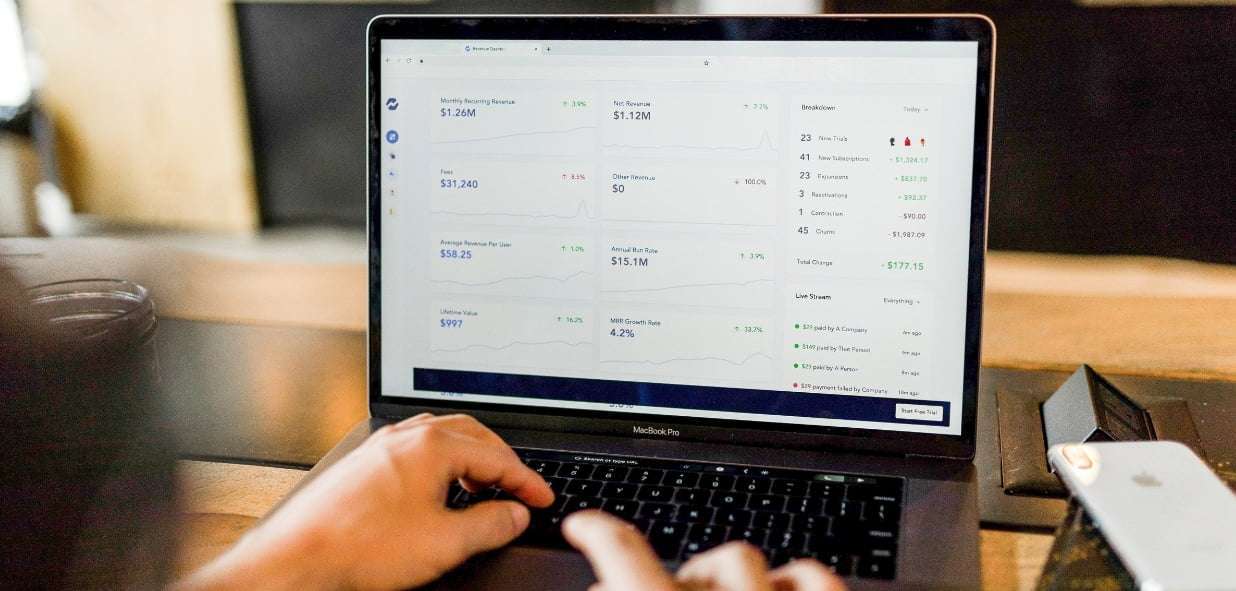Last year, I gave a speech to convince the world that remote work was possible:

Just eight months ago, after seven years of important milestones at Workana, we were still swimming upstream against the current of work traditions. Three months ago, I introduced the platform as, “The Future of Work: Digital, Remote, and Freelance,” and overnight, the rules changed radically. Gone were the days when remote work was an option; now it was a requirement, whether we liked it or not.

We’ve had to adapt to the digital world to survive, full stop. Even my dad who was afraid of using his credit card online downloaded the MercadoLibre app onto his phone. By the way, did anyone else notice that MercadoLibre changed the logo from a handshake to an elbow bump? Awesome!
How has the pandemic affected different industries?
Let’s start with the bad news: the tourism, advertising, retail, and transportation industries have been hit hard and caused some interesting trends like the increase in private transportation (we hope that this includes eco-friendly initiatives such as using bicycles and hybrid cars). On the other hand, sectors like videoconferencing technology, delivery, healthcare, telemedicine, and entertainment are skyrocketing with popularity.
Up until now, the pandemic has had a positive effect for Workana. We understand that it’s the result of a crisis, and the circumstances don’t make us happy, but the numbers don’t lie.
The situation had barely started to get complicated in Spain, a country that was hit hard by the virus, when we began to see a sharp increase in the number of people registering as freelancers, with an average of 20,000 to 30,000 people signing up per week. This is a 50% increase! The number of freelancers logging into the platform rose from 50,000 to approximately 65,000.

Even though this could be an indicator that some people are losing their full time jobs and consequently are looking for new sources of income online, we think another contributing factor is that people are spending more time at home and learning more about freelance life.
On the client side, it’s interesting to see how the quarantine was affecting one another. When the uncertainty began, companies took measures to “freeze everything” en masse, and the number of clients decreased in the early stages, but by the time week ten in quarantine rolled around, companies began to understand that they had to adapt to a new normal (working from home, digitalization, selling online, etc.) and those changes began to counteract the trend.
By week 15, the number of clients was slightly higher than when the pandemic began, and the demand for professionals specialized in digital transformation increased.

The New Low Touch Economy
So what’s next? What will be talking about in the next few months? Although some are optimistic about vaccines, it’s estimated that we won’t be able to return to a pre COVID-19 level until the beginning of next year. But the world can’t put itself on hold anymore, so we’ll have to bring back the rules of a new “low touch economy.”
Generally speaking, this means that social distancing, mobility restrictions, and healthcare will be critical in every respect at work, lifestyle, and socializing.
What are the new “Low Touch” trends in the work world?
Companies at the cutting edge, Google, Facebook, and Twitter, to name a few, were some of the first to send their employees home and not rush them back to the office. In fact, many are already adopting a permanent remote work model. At Workana, we closed our office before quarantine was made official, in part because we were already used to teleworking, and partly because of social responsibility.
What about the companies that reluctantly moved their operations to remote work they had no other choice? Now they’re seeing that they don’t need offices as much as they thought, and they’re even saving time and resources by working remotely.
WFH (Work From Home) Goes PRO
Working from home can be hard without the right tools and support. The trend now is to adapt our workspace as much as possible to suit our needs in terms of productivity and ergonomics. For many, myself included, a large monitor, a comfortable chair, and a great keyboard are enough, but some will have to take a few steps further.
For example, I think of dubbing actors at Netflix assembling small soundproof booths in their closets or employees in the textile industry receiving raw materials from courier companies and creating textiles at home. We expect companies to get used to providing the remote work tools that their employees need.
The Line Between Professional “me” and Personal “me” Has Been Erased
The bookcase behind me in all my video calls makes it clear that besides being the CEO of Workana, I’m a nerd and a diehard Star Wars, anime, and Lord of the Rings fan. My family life sometimes also makes an appearance in my video calls.
Sometimes, working from home can mean that the separation between someone’s personal and professional life is gone, and this can create empathy. And even when that loss of privacy goes beyond what we wanted, those funny moments can be endearing and provide some comic relief from the circumstances that we’re living in.
The Super Digitalization of Work
When we spoke about remote work before, we thought of designers and programmers. Now, personal trainers, psychologists, doctors, coaches, accountants, and even nannies are downloading Zoom and Instagram Live to continue giving advice and consults online, and everything suggests that a lot of professional and service providers will continue on the same path even after the pandemic because of the practicality and cost.
Depression and Anxiety Because of Loneliness
If remote work raised concerns about isolation and depression when it was just an option, these feelings can be amplified by the global pandemic. It’s easy to feel overwhelmed by these circumstances. At Workana, we understand that being far away doesn’t have to mean being disconnected, and that’s why we’ve hosted virtual parties every Friday afternoon to raise everyone’s spirits and boost morale.
It’s worth emphasizing the importance of physical activity, self-care, and keeping in touch with friends and family even if it’s just by videochat.
The Great Reskilling
We’re experiencing historic levels of unemployment, especially in countries like the United States where labor policies are more flexible, and companies can easily hire and fire employees. The current outlook is much worse than the Great Recession, with nearly 6 million people unemployed in less than three months.
Some will recover the same jobs that they had before, but for others, those jobs will disappear. Everyone will have to do an emergency reskilling to adapt to the market’s new demands, and at Workana we’re already working with institutions like the Inter-American Development Bank to create new strategies that allows us to help these employees find a new place in the industry and continue building their careers.
How are Businesses Transforming?
While some companies are completely paralyzed, other companies are relying on agile teams capable of adapting to an environment of uncertainty. AGILE work involves understanding our team’s abilities, setting short and ambitious goals, measuring, implementing, learning, and growing. We keep moving.
In order to maintain this, it’s vital to provide all the necessary technological tools (such as collaborative work software and freelance hiring platforms), quickly and efficiently access certain skills or specialists with specific skill sets to finish specific projects when you can’t hire full time employees. Ultimately in order to survive, it’s essential to create a flexible, dynamic workforce without borders.
On the other hand, a lot of companies are adapting by opening online channels that give consumers direct access, combining B2C strategies with typically B2B models. We will also start to see redesigned factories and restaurants everywhere, more online events, more robot and AI development, services and products that can be offered online, “coronavirus free” certificates in places, food, and products, more private transportation, contact-free payment and delivery, and a long list of changes.
Is your company ready to face these challenges and stay competitive?
HRDAY “The new normal” PDA international
—
You might also be interested in:
- Are you ready to face the new labor pattern?
- Now More Than Ever, Understanding and Leveraging the Benefits of 4.0 Work is Essential to Scaling and Strengthening Your Business
- How Catho Got 500 Employees to Work Remotely in One Week
- Why You Should Hire an Agile Coach
- Chatbots: Why is it important to improve user experience during quarantine?
- [Downloadable material] Remote Work Guide





